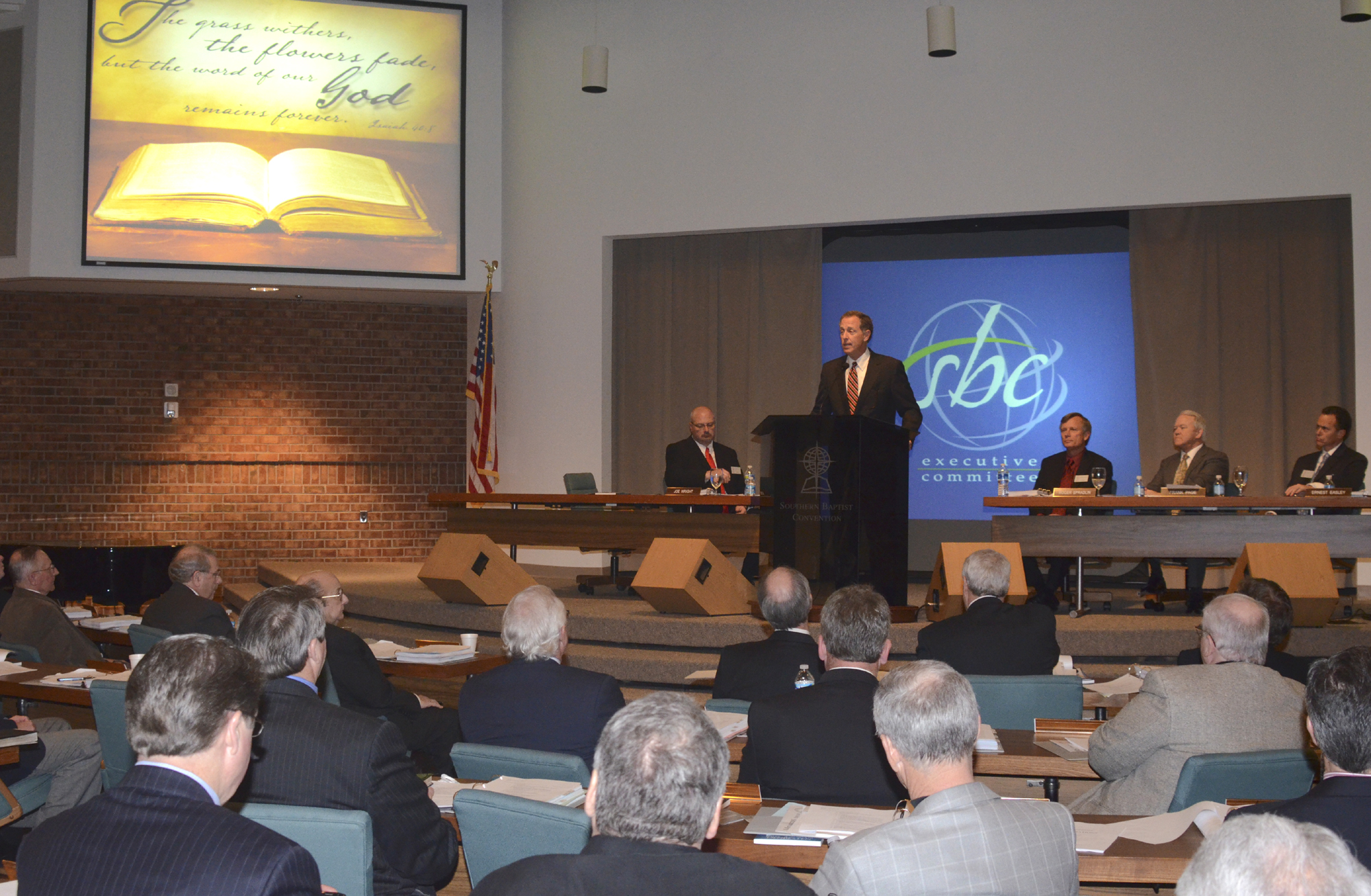
NASHVILLE, Tenn. (BP)–The Christian pastor’s responsibility is not to “save the world” but simply to sow the seeds of the Gospel and leave the results to God, Southern Baptist Convention President Bryant Wright said Feb. 22 in a sermon from what he called an encouraging text for ministers — the Parable of the Sower.
Wright, pastor of Johnson Ferry Baptist Church in Marietta, Ga., said it can be discouraging to watch people lose interest in the Gospel after seemingly being sold-out for Christ. But the parable, he said, makes clear that many people will accept Christ and bear fruit. Wright made the comments during an address to the SBC Executive Committee.
“Let’s not add pressure to ourselves…,” Wright said. “Let’s just recognize that our calling is to sow the seeds, and we’re to sow the seeds to every people group on earth. We are to be passionate about sowing the seeds, but we are to remember that it’s ultimately up to God who enters His Kingdom, and it’s ultimately up to the condition of that soil — that heart — as to how they respond to the Gospel.”
The first three soils in the parable, Wright said, can result in “discouragement” for a pastor who observes members and visitors who fit in each category:
— The seeds in the first soil (Mark 4:4, 15), according to Jesus’ explanation, describe people who, immediately after hearing the Gospel, “Satan comes and takes away the Word which has been sown in them.”
“[It is] the person who rejects the Gospel,” Wright said. “No matter what happens, they are so in bondage to Satan, they love sin more than they love God.” Every time they hear the Gospel, Wright said, they “respond with a hard heart, and the more they respond with a hard heart, the harder that heart becomes.”
— The seeds in the second soil (Mark 4:5-6, 16-17), Jesus said, describe the person who “immediately receives” the Gospel news with joy, but falls away when “affliction or persecution arises.”
“This is a group that we’re all familiar with…. people who respond impulsively to the Gospel message,” Wright said. “And they’re excited about it.” This group might have responded due to emotion or due to a desire to get their “fire insurance” to escape hell, Wright said. But when there is a “calling of sacrifice in following Jesus, they want no part of that.” They are interested only in the benefits of faith, he added.
— The seeds in the third soil (Mark 4:7, 18-19), Jesus said, describe the person who hears the Word, but then the “worries of the world, and the deceitfulness of riches, and the desires for other things enter in and choke the Word, and it becomes unfruitful.”
“I really believe that the majority on our membership rolls fall into this third category,” Wright said. “This is the dirty truth of the church. There is an indication from Jesus that, for a long time, they’re serving, they’re involved, they’re growing, they’re excited. But over the course of living their life, the worries of the world, all the demands and the pulls of the world” lead them away from their “first love.”
Wright told of growing up in his parents’ church and seeing faithful members — teachers and deacons — get to the point they “had nothing to do with the bride of Christ.” Wright recounted that when he became pastor of Johnson Ferry in the 1980s, he believed that strong discipleship programs and strong Bible teaching and preaching would prevent similar circumstances from happening in his church. But he soon saw that what had happened at his parents’ church was taking place in his as well.
Making clear he does not believe a Christian can lose his or her salvation, Wright said the people in the third category are Christians who were saved — they “were fruitful” at one point — but have “lost their first love.”
“In the heart and life of our churches, there is so much lost spiritual vitality because of what has happened in the lives of those in this third group,” Wright said. “I have a hunch, that if you were really honest about your local church, you would find a lot on the membership rolls that fall into this category.”
— The seeds in the fourth and final soil (Mark 4:8, 20), Jesus said, describe the person who hears the Word, accepts it and bears “fruit, thirty, sixty, and a hundredfold.”
“That is the fruit of a person who has genuinely come to salvation in Christ,” Wright said.
“It is the spirit and a character [of a person] that is growing to become more like Jesus, who is the perfect embodiment of the fruit of the Spirit.” Fruit, Wright said, involves not only displaying the fruit of the Spirit as listed in Galatians 5:22-23 — love, joy, peace, patience, kindness, goodness, faithfulness, gentleness and self-control — but also seeing others come to Christ.
“I am so thankful that Jesus included this last soil,” Wright said, “because when you pastor a church for any length of time” there is a “human discouragement because of those first three soils, but there is tremendous joy and fulfillment as we think about the good soil.”
–30–
Michael Foust is associate editor of Baptist Press.

















